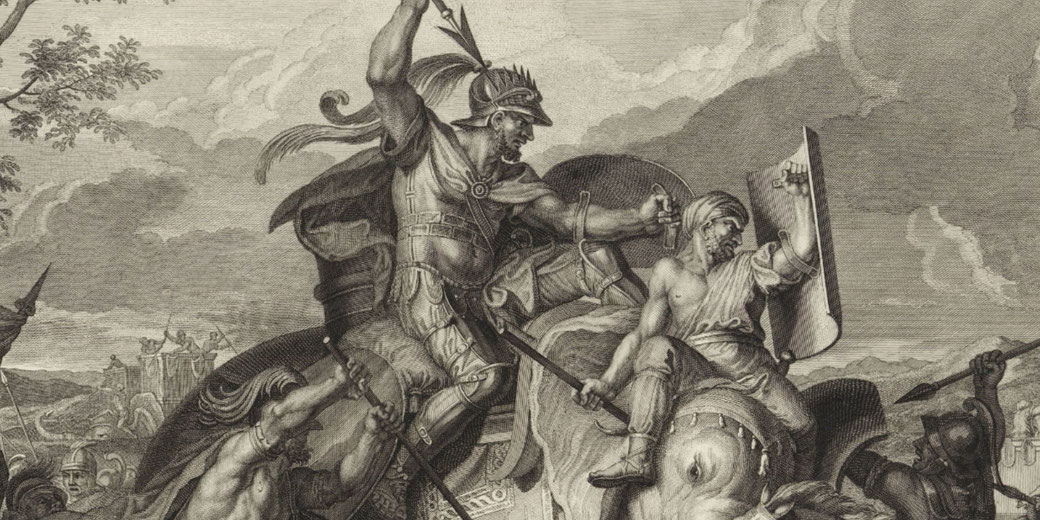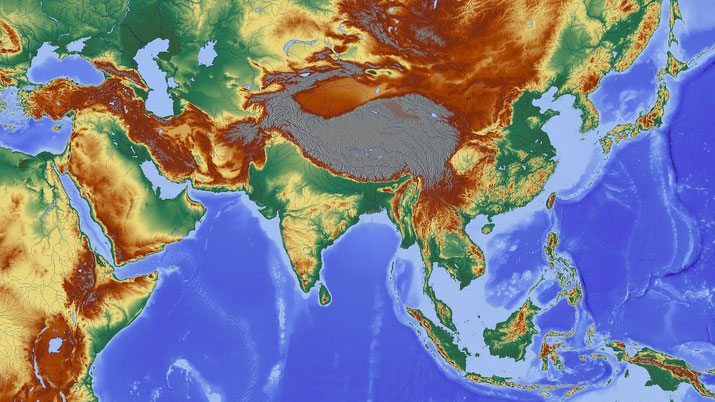The Battle of the Hydaspes River: Was this Alexander the Great's last major battle?

In 326 BC, a young and ambitious Alexander the Great led his army against the mighty Indian king, Porus, on the banks of the Hydaspes River.
This battle would be one of the most significant in Alexander's career - not only did he win, but he also conquered a vast new territory that would later become part of his ever-growing empire.
The rise of Alexander the Great
When Alexander set out on his expedition to India in 328 BC, he had already conquered most of the known world.
At just 26 years old, he was the king of Macedonia and Greece, and he had already defeated some of the greatest armies of his time.
In 331 BC, he had defeated Darius III and conquered the Persian Empire. After burning the Persian capital city, Persepolis, to the ground, Alexander led his troops into the eastern provinces of the Persian Empire (modern-day Afghanistan) in 330 BC.
After many years of war in the region, he reached the edge of India in 327 BC.
Alexander's march into India
The ancient Greeks knew about the region of India because the Persian Empire had conquered parts of it.
The size and scale of the Indian subcontinent was daunting, and Alexander knew that he would need all of his military prowess to succeed.
In 327 BC, Alexander and his army crossed the Hindu Kush mountains into India.
They were met with little resistance at first, as the local tribes were intimidated by the mighty Macedonian army.
Many of the princes in the regions, such as Taxiles, became allies rather than fight against them.
As they continued their march eastward, however, they began to meet more resistance from the Indian kings who ruled over small kingdoms in present-day Pakistan.
The most significant opponent they faced was Porus, the king of a region called Paurava (in present-day Punjab).
Porus was not intimidated by Alexander's reputation or his past victories; he was determined to defend his homeland from the invaders.
Alexander suggested a peaceful resolution that didn't require a battle. He offered that Porus could avoid fighting if he simply paid Alexander a large tribute.
Porus turned down the offer.
Battle preparations
Alexander's army numbered around 45,000 men, which included cavalry and infantry.
Porus, on the other hand, had an army of over 30,000 men and 1000 chariots.
Also, King Porus had one weapon of war that Alexander didn't: around 130 war elephants.
These massive animals were used in battle to trample enemy troops, and they were a formidable force.
In addition, horses were naturally scared of elephants, and would normally flee at the sight of them.
However, elephants were frequently nervous enemies and could be easily frightened under the right circumstances.

Porus had received word of Alexander's advance and gathered his own forces. The Indian king marched his armies westward and stumbled across the Macedonians on the banks of the Hydaspes River in May of 326 BC, in what is now modern-day Pakistan.
Crossing the river at night
The Hydaspes River was a significant geographical obstacle. Firstly, it was deep and fast-flowing, making it difficult to cross.
This was the result of heavy monsoon rains, which were occurring at the time, and had made the river swell larger than normal.
Secondly, Porus had positioned his troops and chariots on the opposite side of the river, making it even more difficult for Alexander to get to them.
Alexander had ordered that boats be brought in from his new allies to help in his plan.
Alexander made a public show of his troop movements to indicate to his enemy that he was willing to wait for the river to subside before crossing.
He ordered his men to build a camp and light campfires. This was meant to lull Porus into a sense of complacency.
However, Alexander intended to sneak across the river at night, but it took him several nights of scouting to find a suitable location that would not alert Porus to his plan.
Porus' scouts had noticed movements in the Macedonian camp at night and had initially followed them, but the Indian king eventually decided that it was a simple distraction and ordered his troops to stop following.
When Alexander saw that his enemies were no longer shadowing his movements, he decided it was time to strike.
His scouts had found a suitable crossing point around 25 kilometres upstream and that night, Alexander set off with a small part of his army.
Under the cover of darkness, Alexander led his forces across the fast-flowing river to what he thought was the opposite riverbank.
A chance storm also hit, which helped muffle the sound of his troop movements. However, once they arrived, he discovered it was only an island in the middle of the river.
With dawn approaching, Alexander ordered his men into the water once more to make it to the other side, as planned.
They made it with very little time to spare.
The Battle of the Hydaspes
When dawn broke, Porus was surprised to hear that the Macedonians were now on the same side of the river as he was.
Quickly, Porus marched his forces north to engage with Alexander.
Before Alexander had left his camp the day before, he had given orders to the commanders in charge of the main part of his army, not to march across the river until they saw Porus move to attack Alexander.
In the morning hours, when they saw the Indian troops moving north, the main Macedonian forces then began crossing the river.
The battle began with both sides sending out their cavalry to engage each other on the two flanks of the armies.
Alexander led those on the right flank, as usual. After a difficult fight, Alexander's cavalry was victorious, and they managed to push back Porus' chariots, which had become immobile in the muddy conditions.
Porus ordered his elephants forward to attack the Macedonian infantry. Even though Alexander's troops were prepared for them, they took heavy casualties from the large animals.
The Macedonians used long spears to cause as much pain as possible to the beasts, as a well as trying to cut their legs using large axes.
The combination of these attacks frightened the elephants and the animals stampeded back through the Indian ranks, trampling their own men in the process.
With the enemy's elephants out of the way, Alexander's cavalry was able to charge Porus' men from the rear while the infantry engaged from the front.
They rode through the Indian ranks, cutting down anyone who got in their way. The Macedonian infantry soon followed, and the Battle of Hydaspes turned into a massacre.
The Macedonians emerged victorious.
Aftermath of the battle
The Battle of Hydaspes was a resounding victory for Alexander and his army. Not only had he conquered a new territory, but he had also defeated one of the most fearsome weapons of war at the time - elephants.
Around 12,000 Indian soldiers and 80 elephants are estimated to have died in the battle, with only around 1,000 Macedonian losses.
Porus was eventually captured and brought before Alexander as a prisoner. When asked by Alexander why he had resisted his conquest, Porus replied that it was his duty as a king to defend his kingdom from invaders.
Alexander told him that he admired him for his courage and ambition - even though they were enemies.
In the end, Alexander spared Porus' life and made him an allied king instead.
Macedonians refuse to fight on
The Battle of Hydaspes was the last major battle that Alexander's army fought. After this victory, the Macedonians refused to fight any further.
They had been on the campaign for over eight years and were homesick. They also didn't see any point in conquering more territory, as they already controlled a vast empire.
Alexander was forced to turn back and head home, even though he still had unfinished business in India.
However, he would never return to India again. Alexander had to march his army south in order to get to the ocean so that he could sail back home with his men.
On the way, Alexander still had to fight his way to freedom. Sadly, on the march south through India, Alexander's favourite horse, Bucephalus, died.
It was either a result of battle wounds, or of old age. To honour the loss, Alexander founded a new city and named it Bucephalia.
Mallian campaign
The first challenge Alexander and his troops faced on the march back home was the Mallian campaign.
Alexander had asked the permission of the people of Mali for safe passage through their lands in return for not being conquered.
The Mallians were suspicious and refused.
In response, Alexander laid siege to their city. When the Macedonians had broken through the walls of the city, Alexander was too eager and moved too far ahead of his bodyguard.
As a result, he was surrounded by enemies and struck down.
Alexander's soldiers finally reached him and were able to save his life at the last moment.
However, Alexander would face a long recovery.
Reaching the Indian Ocean
After the Mallian campaign, Alexander and his troops continued their journey south.
They eventually reached the Indian Ocean where they were able to sail back home. Some of his troops had to follow the ships on land due to the sheer number of the soldiers.
The journey home was long and difficult, with many people dying on the journey. However, Alexander's men finally arrived back in Babylon in 323.
However, what people didn't know was that Alexander would soon be dead.

What do you need help with?
Download ready-to-use digital learning resources
Copyright © History Skills 2014-2025.
Contact via email
With the exception of links to external sites, some historical sources and extracts from specific publications, all content on this website is copyrighted by History Skills. This content may not be copied, republished or redistributed without written permission from the website creator. Please use the Contact page to obtain relevant permission.





